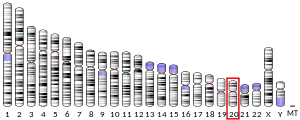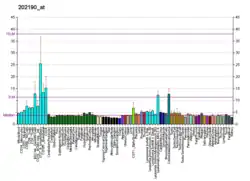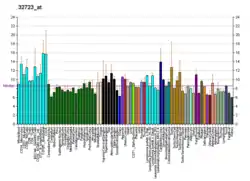CSTF1
Cleavage stimulation factor 50 kDa subunit is a protein that in humans is encoded by the CSTF1 gene.[5][6][7]
| CSTF1 | |||||||||||||||||||||||||||||||||||||||||||||||||||
|---|---|---|---|---|---|---|---|---|---|---|---|---|---|---|---|---|---|---|---|---|---|---|---|---|---|---|---|---|---|---|---|---|---|---|---|---|---|---|---|---|---|---|---|---|---|---|---|---|---|---|---|
| Identifiers | |||||||||||||||||||||||||||||||||||||||||||||||||||
| Aliases | CSTF1, CstF-50, CstFp50, cleavage stimulation factor subunit 1 | ||||||||||||||||||||||||||||||||||||||||||||||||||
| External IDs | OMIM: 600369 MGI: 1914587 HomoloGene: 1012 GeneCards: CSTF1 | ||||||||||||||||||||||||||||||||||||||||||||||||||
| |||||||||||||||||||||||||||||||||||||||||||||||||||
| |||||||||||||||||||||||||||||||||||||||||||||||||||
| |||||||||||||||||||||||||||||||||||||||||||||||||||
| |||||||||||||||||||||||||||||||||||||||||||||||||||
| |||||||||||||||||||||||||||||||||||||||||||||||||||
| Wikidata | |||||||||||||||||||||||||||||||||||||||||||||||||||
| |||||||||||||||||||||||||||||||||||||||||||||||||||
This gene encodes one of three subunits which combine to form cleavage stimulation factor (CSTF). CSTF is involved in the polyadenylation and 3' end cleavage of pre-mRNAs. Similar to mammalian G protein beta subunits, this protein contains transducin-like repeats. Several transcript variants with different 5' UTR, but encoding the same protein, have been found for this gene.[7]
References
- GRCh38: Ensembl release 89: ENSG00000101138 - Ensembl, May 2017
- GRCm38: Ensembl release 89: ENSMUSG00000027498 - Ensembl, May 2017
- "Human PubMed Reference:". National Center for Biotechnology Information, U.S. National Library of Medicine.
- "Mouse PubMed Reference:". National Center for Biotechnology Information, U.S. National Library of Medicine.
- Takagaki Y, Manley JL (November 1992). "A human polyadenylation factor is a G protein beta-subunit homologue". The Journal of Biological Chemistry. 267 (33): 23471–4. doi:10.1016/S0021-9258(18)35861-7. PMID 1358884.
- Kleiman FE, Manley JL (March 2001). "The BARD1-CstF-50 interaction links mRNA 3' end formation to DNA damage and tumor suppression". Cell. 104 (5): 743–53. doi:10.1016/S0092-8674(01)00270-7. PMID 11257228. S2CID 15022237.
- "Entrez Gene: CSTF1 cleavage stimulation factor, 3' pre-RNA, subunit 1, 50kDa".
- Kleiman FE, Manley JL (September 1999). "Functional interaction of BRCA1-associated BARD1 with polyadenylation factor CstF-50". Science. 285 (5433): 1576–9. doi:10.1126/science.285.5433.1576. PMID 10477523.
External links
- Human CSTF1 genome location and CSTF1 gene details page in the UCSC Genome Browser.
Further reading
- Takagaki Y, MacDonald CC, Shenk T, Manley JL (February 1992). "The human 64-kDa polyadenylylation factor contains a ribonucleoprotein-type RNA binding domain and unusual auxiliary motifs". Proceedings of the National Academy of Sciences of the United States of America. 89 (4): 1403–7. Bibcode:1992PNAS...89.1403T. doi:10.1073/pnas.89.4.1403. PMC 48459. PMID 1741396.
- Murthy KG, Manley JL (November 1995). "The 160-kD subunit of human cleavage-polyadenylation specificity factor coordinates pre-mRNA 3'-end formation". Genes & Development. 9 (21): 2672–83. doi:10.1101/gad.9.21.2672. PMID 7590244.
- Takagaki Y, Manley JL (December 1994). "A polyadenylation factor subunit is the human homologue of the Drosophila suppressor of forked protein". Nature. 372 (6505): 471–4. Bibcode:1994Natur.372..471T. doi:10.1038/372471a0. PMID 7984242. S2CID 4329672.
- Rüegsegger U, Beyer K, Keller W (March 1996). "Purification and characterization of human cleavage factor Im involved in the 3' end processing of messenger RNA precursors". The Journal of Biological Chemistry. 271 (11): 6107–13. doi:10.1074/jbc.271.11.6107. PMID 8626397.
- Kleiman FE, Manley JL (September 1999). "Functional interaction of BRCA1-associated BARD1 with polyadenylation factor CstF-50". Science. 285 (5433): 1576–9. doi:10.1126/science.285.5433.1576. PMID 10477523.
- Takagaki Y, Manley JL (March 2000). "Complex protein interactions within the human polyadenylation machinery identify a novel component". Molecular and Cellular Biology. 20 (5): 1515–25. doi:10.1128/MCB.20.5.1515-1525.2000. PMC 85326. PMID 10669729.
- Fong N, Bentley DL (July 2001). "Capping, splicing, and 3' processing are independently stimulated by RNA polymerase II: different functions for different segments of the CTD". Genes & Development. 15 (14): 1783–95. doi:10.1101/gad.889101. PMC 312735. PMID 11459828.
- Andersen JS, Lyon CE, Fox AH, Leung AK, Lam YW, Steen H, Mann M, Lamond AI (January 2002). "Directed proteomic analysis of the human nucleolus". Current Biology. 12 (1): 1–11. doi:10.1016/S0960-9822(01)00650-9. PMID 11790298. S2CID 14132033.
- Rush J, Moritz A, Lee KA, Guo A, Goss VL, Spek EJ, Zhang H, Zha XM, Polakiewicz RD, Comb MJ (January 2005). "Immunoaffinity profiling of tyrosine phosphorylation in cancer cells". Nature Biotechnology. 23 (1): 94–101. doi:10.1038/nbt1046. PMID 15592455. S2CID 7200157.
- Tsuzuki M, Wu W, Nishikawa H, Hayami R, Oyake D, Yabuki Y, Fukuda M, Ohta T (February 2006). "A truncated splice variant of human BARD1 that lacks the RING finger and ankyrin repeats". Cancer Letters. 233 (1): 108–16. doi:10.1016/j.canlet.2005.03.012. PMID 15878232.
This article is issued from Wikipedia. The text is licensed under Creative Commons - Attribution - Sharealike. Additional terms may apply for the media files.





